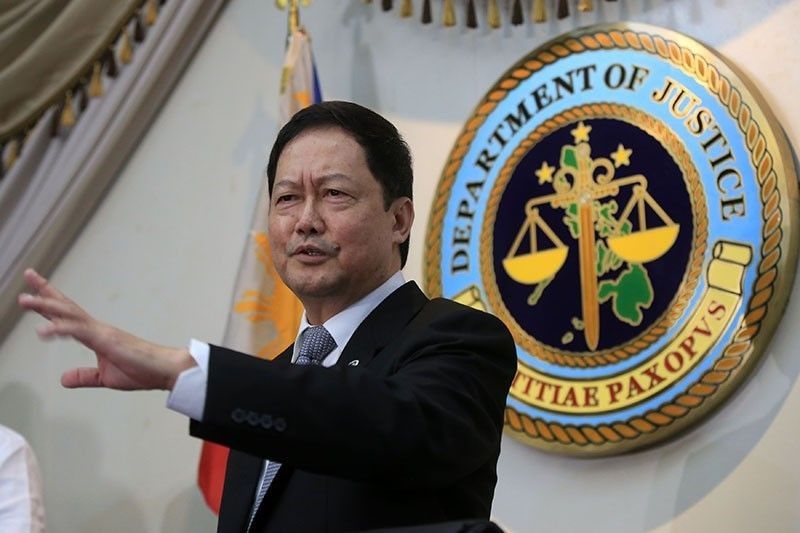DOJ vows 'thorough review' of constitutionality of anti-terrorism bill

MANILA, Philippines — The Department of Justice will conduct a thorough look into the constitutionality of the controversial anti-terrorism bill, its Secretary Menardo Guevarra said, stressing that the promise of a review is “not a mere perfunctory statement.”
The controversial anti-terrorism bill was sent to the Palace on Tuesday for President Rodrigo Duterte's signature amid strong contention from lawyers and other sectors due to its alleged constitutional infirmities. The bill, which the House of Representatives passed last week, has been steadily gaining opposition from the business community and the academe aside from activist and human rights groups.
"Our deadline will be set by the [Office of the President], but we’ll work in an internal timetable of 15 days, starting today," Guevarra told reporters in a text message.
READ: 30-day countdown begins as anti-terrorism bill reaches Duterte's desk
The DOJ review is crucial, as Sen. Panfilo Lacson, sponsor of the bill at the Senate, earlier said that the the department "can still interfere by advising the president to veto the bill altogether.” As it is, Duterte can sign the bill—which he himself certified as urgent—into law, veto it, or not act on it and it will lapse into law in 30 days or on July 9.
Guevarra said that it is “standard practice to request comments from relevant agencies concerned.”
“The Palace statement that the anti-terror bill will be reviewed is not a mere perfunctory statement. From my experience as a former senior deputy executive secretary, I know that all enrolled bills are carefully scrutinized with the help of the relevant executive agencies before they are submitted to the president for appropriate action,” he added.
Guevarra was senior deputy executive secretary before being appointed to the DOJ and was deputy executive secretary for legal affairs during the administration of President Benigno Aquino III. He previously said, in response to a call to revive the Marcos-era Anti-Subversion Law, that “being a leftist is far from being a terrorist.”
In 2019, Guevarra also said however that the Human Security Act of 2007—the law that anti-terrorism bill would repeal—should be “amended and given more teeth.”
Guevarra then said the law has weaknesses "such as very short custodial investigation periods and huge penalties for wrongful prosecution, even if done in good faith," that need to be adapted to the times.
READ: 'Being leftist is far from being a terrorist,' Justice secretary stresses
Clearer definitions in Implementing Rules
Guevarra also said that should the anti-terrorism bill became a law, the DOJ “will endeavour to define more clearly, in the [Implementing Rules and Regulation] that the Anti-Terrorism Council (ATC) and the DOJ will be tasked to promulgate, the parameters within which the law will be implemented and enforced, in order to erase any latitude for misapplication or abuse.”
The ATC is chaired by the executive secretary and composed of Cabinet secretaries, including DOJ chief.
Several groups of lawyers—including their national organization, the Integrated Bar of the Philippines—have warned that provisions of the bill such as a 24-day warrantless detention and the power given to the council are unconstitutional, prone to abuse and may be against the principle of checks and balances.
RELATED: DOJ official: 'Cursory reading' of anti-terrorism bill shows dissent, protest not prohibited
Under the looming new law, the “ATC may designate an individual, groups of persons, organization, or association, whether domestic or foreign, upon finding of probable cause that the individual, groups of persons, organization, or association commit, or attempt to commit, or conspire in the commission of the acts defined [as terrorism].”
The defense department and military officials have long and repeatedly accused activist groups, as well as human rights organizations, rights lawyers and even journalists, of being "communist terrorists" or their sympathizers.
Citing the review, Guevarra refused to comment on specific provisions on the bill, including the secretary of justice’s power and role in review of complaints elevated to his office.
A petition for review of a complaint may be filed before the Office of the Justice Secretary.
Guevarra however explained that the “ATC is essentially a policy-making body.”
“On the other hand, the national prosecution service determines the existence or non-existence of probable cause on the basis of evidence actually presented before it,” he added.
Guevarra said that the justice secretary “has no participation in the investigative process, but exercises the power or review.”
“His role as a member of the ATC which deals with policies and his role as reviewing authority by the national prosecution service are separable and can be performed independently of each other,” he added.
- Latest
- Trending

































